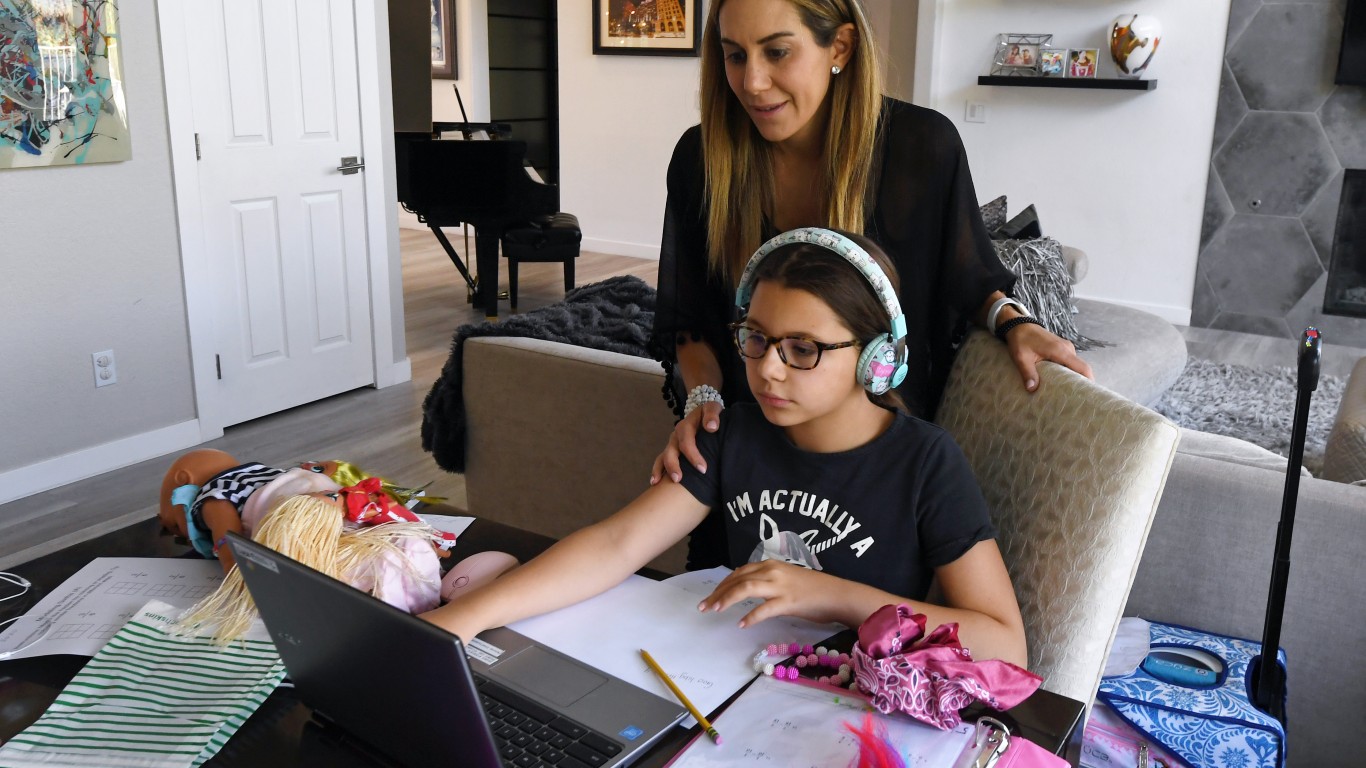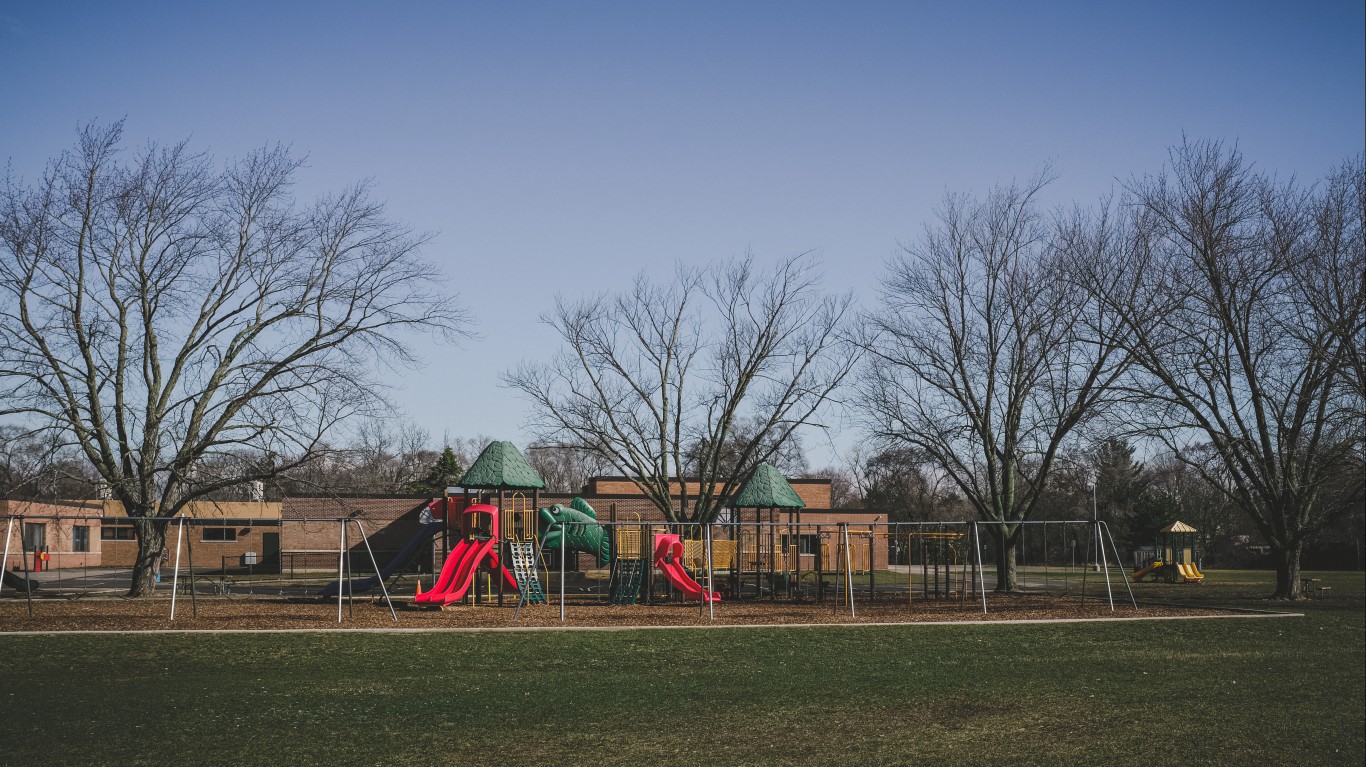
The scores of fourth- and eighth-grade American students testing in a national exam in reading and math declined significantly. Setbacks in mathematics were especially striking, with scores falling more than in any other year since the test – known as the National Assessment of Educational Progress or NAEP – was first administered in the early 1990s.
While there is no single explanation for the drop, experts attribute the historic decline primarily to the disruptions stemming from the pandemic, underscoring COVID-19’s considerable toll, far beyond public health. (Here is a look at the best places to teach in America.)
The share of fourth-graders considered to be proficient in math fell 5 percentage points from 2019, the last time the test was administered. Eighth-grade math proficiency suffered even more, down 8 percentage points. This year, only 36% of fourth-graders and 26% of eighth-graders were proficient in math – and in some states, proficiency rates were far lower.
Using data from the NAEP, 24/7 Wall St. identified the states where students’ math scores the worst. States are ranked on the average share of fourth-and eighth-grade students proficient in math. In the case of a tie, the state that spends less on education per pupil ranks lower. In each of the 24 states on this list, average math proficiency among fourth- and eighth-graders is below 29%.
In 2021, the federal government invested $123 billion in public education to help students catch up in the wake of the pandemic. The latest test results reveal it may take billions more. While the link between per pupil spending and student outcomes is complicated, most of the states on this list invest less on a per student basis in their education system than most other states, according to the latest data from the Department of Education. (Here is a look at how much each state spends on public schools.)
Miquel Cardona, the secretary of education, summed up what is at stake in improving reading and math proficiency. “This is a moment of truth for education,” he said. “How we respond to this will determine not only our recovery, but our nation’s standing in the world.”
Click here to see states where students score the worst in math.
19. Michigan
> Avg. share of 4th and 8th graders proficient in math: 28.5%
> 4th graders proficient in math: 32% – 17th lowest (-4 ppt. from 2019)
> 8th graders proficient in math: 25% – 24th highest (-8 ppt. from 2019)
> Avg. annual per pupil spending in state: $11,211 – 18th lowest
[in-text-ad]

18. New York
> Avg. share of 4th and 8th graders proficient in math: 28%
> 4th graders proficient in math: 28% – 10th lowest (-10 ppt. from 2019)
> 8th graders proficient in math: 28% – 16th highest (-6 ppt. from 2019)
> Avg. annual per pupil spending in state: $23,429 – the highest
17. Maryland
> Avg. share of 4th and 8th graders proficient in math: 28%
> 4th graders proficient in math: 31% – 13th lowest (-10 ppt. from 2019)
> 8th graders proficient in math: 25% – 24th highest (-11 ppt. from 2019)
> Avg. annual per pupil spending in state: $15,148 – 14th highest
16. Maine
> Avg. share of 4th and 8th graders proficient in math: 28%
> 4th graders proficient in math: 32% – 17th lowest (-8 ppt. from 2019)
> 8th graders proficient in math: 24% – 23rd lowest (-10 ppt. from 2019)
> Avg. annual per pupil spending in state: $14,720 – 15th highest
[in-text-ad-2]

15. South Carolina
> Avg. share of 4th and 8th graders proficient in math: 28%
> 4th graders proficient in math: 34% – 23rd lowest (-3 ppt. from 2019)
> 8th graders proficient in math: 22% – 13th lowest (-7 ppt. from 2019)
> Avg. annual per pupil spending in state: $11,359 – 22nd lowest

14. Arizona
> Avg. share of 4th and 8th graders proficient in math: 28%
> 4th graders proficient in math: 32% – 17th lowest (-6 ppt. from 2019)
> 8th graders proficient in math: 24% – 23rd lowest (-9 ppt. from 2019)
> Avg. annual per pupil spending in state: $8,648 – 3rd lowest
[in-text-ad]

13. Kentucky
> Avg. share of 4th and 8th graders proficient in math: 27%
> 4th graders proficient in math: 33% – 18th lowest (-6 ppt. from 2019)
> 8th graders proficient in math: 21% – 10th lowest (-9 ppt. from 2019)
> Avg. annual per pupil spending in state: $11,291 – 21st lowest

12. California
> Avg. share of 4th and 8th graders proficient in math: 26.5%
> 4th graders proficient in math: 30% – 12th lowest (-4 ppt. from 2019)
> 8th graders proficient in math: 23% – 17th lowest (-6 ppt. from 2019)
> Avg. annual per pupil spending in state: $13,679 – 17th highest

11. Alaska
> Avg. share of 4th and 8th graders proficient in math: 25.5%
> 4th graders proficient in math: 28% – 10th lowest (-6 ppt. from 2019)
> 8th graders proficient in math: 23% – 17th lowest (-4 ppt. from 2019)
> Avg. annual per pupil spending in state: $18,393 – 4th highest
[in-text-ad-2]

10. Oregon
> Avg. share of 4th and 8th graders proficient in math: 25.5%
> 4th graders proficient in math: 29% – 11th lowest (-8 ppt. from 2019)
> 8th graders proficient in math: 22% – 13th lowest (-9 ppt. from 2019)
> Avg. annual per pupil spending in state: $11,778 – 24th lowest

9. Mississippi
> Avg. share of 4th and 8th graders proficient in math: 25%
> 4th graders proficient in math: 32% – 17th lowest (-7 ppt. from 2019)
> 8th graders proficient in math: 18% – 5th lowest (-8 ppt. from 2019)
> Avg. annual per pupil spending in state: $9,303 – 6th lowest
[in-text-ad]

8. Nevada
> Avg. share of 4th and 8th graders proficient in math: 24.5%
> 4th graders proficient in math: 28% – 10th lowest (-6 ppt. from 2019)
> 8th graders proficient in math: 21% – 10th lowest (-5 ppt. from 2019)
> Avg. annual per pupil spending in state: $9,159 – 5th lowest

7. Arkansas
> Avg. share of 4th and 8th graders proficient in math: 23.5%
> 4th graders proficient in math: 28% – 10th lowest (-5 ppt. from 2019)
> 8th graders proficient in math: 19% – 8th lowest (-7 ppt. from 2019)
> Avg. annual per pupil spending in state: $10,084 – 12th lowest
6. Louisiana
> Avg. share of 4th and 8th graders proficient in math: 23%
> 4th graders proficient in math: 27% – 6th lowest (-3 ppt. from 2019)
> 8th graders proficient in math: 19% – 8th lowest (-6 ppt. from 2019)
> Avg. annual per pupil spending in state: $11,800 – 25th lowest
[in-text-ad-2]

5. Alabama
> Avg. share of 4th and 8th graders proficient in math: 23%
> 4th graders proficient in math: 27% – 6th lowest (no change from 2019)
> 8th graders proficient in math: 19% – 8th lowest (-4 ppt. from 2019)
> Avg. annual per pupil spending in state: $10,076 – 11th lowest

4. Delaware
> Avg. share of 4th and 8th graders proficient in math: 22%
> 4th graders proficient in math: 26% – 3rd lowest (-14 ppt. from 2019)
> 8th graders proficient in math: 18% – 5th lowest (-12 ppt. from 2019)
> Avg. annual per pupil spending in state: $15,910 – 11th highest
[in-text-ad]

3. Oklahoma
> Avg. share of 4th and 8th graders proficient in math: 21.5%
> 4th graders proficient in math: 27% – 6th lowest (-8 ppt. from 2019)
> 8th graders proficient in math: 16% – 3rd lowest (-13 ppt. from 2019)
> Avg. annual per pupil spending in state: $9,144 – 4th lowest

2. West Virginia
> Avg. share of 4th and 8th graders proficient in math: 19%
> 4th graders proficient in math: 23% – 2nd lowest (-6 ppt. from 2019)
> 8th graders proficient in math: 15% – 2nd lowest (-12 ppt. from 2019)
> Avg. annual per pupil spending in state: $11,944 – 24th highest

1. New Mexico
> Avg. share of 4th and 8th graders proficient in math: 16%
> 4th graders proficient in math: 19% – the lowest (-10 ppt. from 2019)
> 8th graders proficient in math: 13% – the lowest (-10 ppt. from 2019)
> Avg. annual per pupil spending in state: $10,167 – 15th lowest
Are You Still Paying With a Debit Card?
The average American spends $17,274 on debit cards a year, and it’s a HUGE mistake. First, debit cards don’t have the same fraud protections as credit cards. Once your money is gone, it’s gone. But more importantly you can actually get something back from this spending every time you swipe.
Issuers are handing out wild bonuses right now. With some you can earn up to 5% back on every purchase. That’s like getting a 5% discount on everything you buy!
Our top pick is kind of hard to imagine. Not only does it pay up to 5% back, it also includes a $200 cash back reward in the first six months, a 0% intro APR, and…. $0 annual fee. It’s quite literally free money for any one that uses a card regularly. Click here to learn more!
Flywheel Publishing has partnered with CardRatings to provide coverage of credit card products. Flywheel Publishing and CardRatings may receive a commission from card issuers.
Thank you for reading! Have some feedback for us?
Contact the 24/7 Wall St. editorial team.

 24/7 Wall St.
24/7 Wall St.




